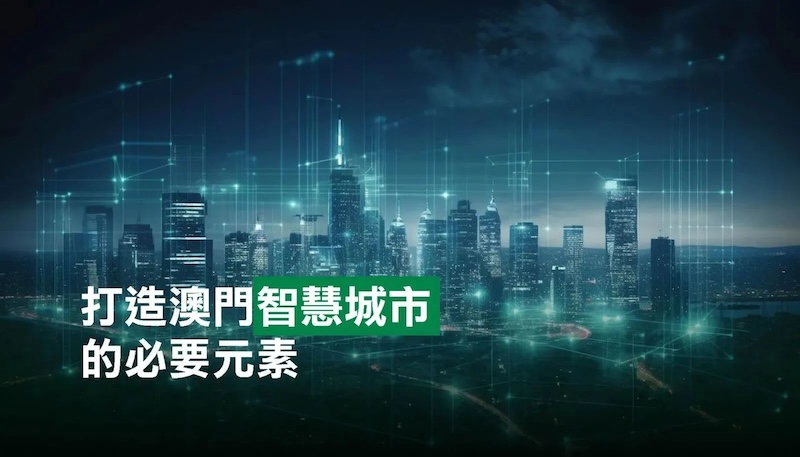All over the world are working to build smart cities. The so-called smart city refers to the introduction of cutting-edge technology, such as face recognition, artificial intelligence and the Internet of Things connecting various devices, and then collect big data to improve the efficiency of urban operation, so as to promote the sustainable development of cities and benefit the people.
For example, the huge amount of data optimizes traffic management, transportation systems, waste collection, and energy systems. Grasping reliable real-time data can help to improve public safety with intelligent monitoring and image analysis systems. The Macao, China government is also committed to accelerating the process of smart city in Macao. In his 2016 policy address, he mentioned the five-year plan, pointing out that he should achieve the goal of building a smart city, join the ranks of major cities in the world, and achieve the United Nations 2030 Sustainable Development Goals together.
Below, we specifically list what key elements Macao must have to become a smart city.
electronic payment
An important part of the development of smart cities is the function of fintech and digital enterprises. After Macao, China launched the one-home access service in Macao in 2020, the digitalization of local transactions has made great progress. The app has attracted more than 300,000 users, using the platform to pay for water, electricity and coal, arrange medical appointments and submit application documents online. So far, the app offers more than 120 services, and it is constantly adding new services, such as venue rentals and visa applications. Move public toilets, pavement, greening, ancillary facilities, etc.
Public security
Another necessary step in developing smart cities is to install more intelligent surveillance systems and add video analysis and face recognition functions to improve public safety.
Macau Wei'an, a subsidiary of China Anke, has developed face recognition technology, which can be added to the monitoring system to identify personal identity with appearance, personal characteristics and behavior, which is more accurate and ideal than the naked eye. Combining the system with high-end video analysis solutions, artificial intelligence and machine learning can play various high-end functions such as object tracking, license plate discrimination, stay and wandering monitoring, number counting and queuing management, so as to form a strong and powerful auxiliary tool for smart city.
Medical care and personalized medical care security
Big data helps to improve the efficiency and effectiveness of health care for patients and healthcare workers. At present, Macao's intelligent medical insurance system is in its infancy, and major hospitals can share basic data, which shows that there is a wide space for improvement. Especially after the modification of privacy and data collection laws, there will be more space to build a smarter healthcare system.
Another smart healthcare category that can be widely used is individual healthcare. The two-in-one mobile scheme of life sign monitoring individuals, a subsidiary of Macau, can comprehensively monitor life representation and detect falling behavior, which can help reduce the pressure of caregivers. When the user's health has deteriorated or falling behavior, or the system detects that the user is ready to get out of bed and predicts the risk of falling, the system will notify the responsible person in real time to achieve more effective nursing protection.
Smart waste disposal
In order to achieve a truly sustainable development of smart city, we must start from improving the efficiency of waste management. The installation of such smart dustbins provided by Macau Wei'an Institute in cities can greatly improve the cleanliness of urban roads, and the departments responsible for garbage disposal can also optimize the route of garbage collection through the fleet management platform.
The system adopts the Internet of things technology, when the intelligent dustbin needs to be emptied, and the intelligent dustbin is also equipped with solar powered compressor, which can increase the capacity of the dustbin, reduce the number of garbage collection.
Another innovative intelligent waste management solution is the automatic sorting and recycling bin, which uses high-end artificial intelligence and image processing technology to identify the categories of items placed in the box in real time and automatically put into plastic, paper, metal or glass sorting containers. Users do not have to classify themselves in advance to improve the recovery rate. When the recycling bin is full, the system will send a notice to the waste collector for clearance.
traffic control
The Macau Transport Bureau has launched a bus station mobile application to provide users with real-time bus schedules and other useful traffic information.
By using the city's Internet of Things smart devices, there will be more room for this expansion, such as providing real-time information about road congestion and vacant parking Spaces.
Macao, a subsidiary of China Anke, continues to support the intelligent process of Macao, improving public safety with face recognition and video analysis technologies. It also has various intelligent applications such as life sign monitoring, fall detection sensors and intelligent waste management, to promote the development process of smart city in Macao.


